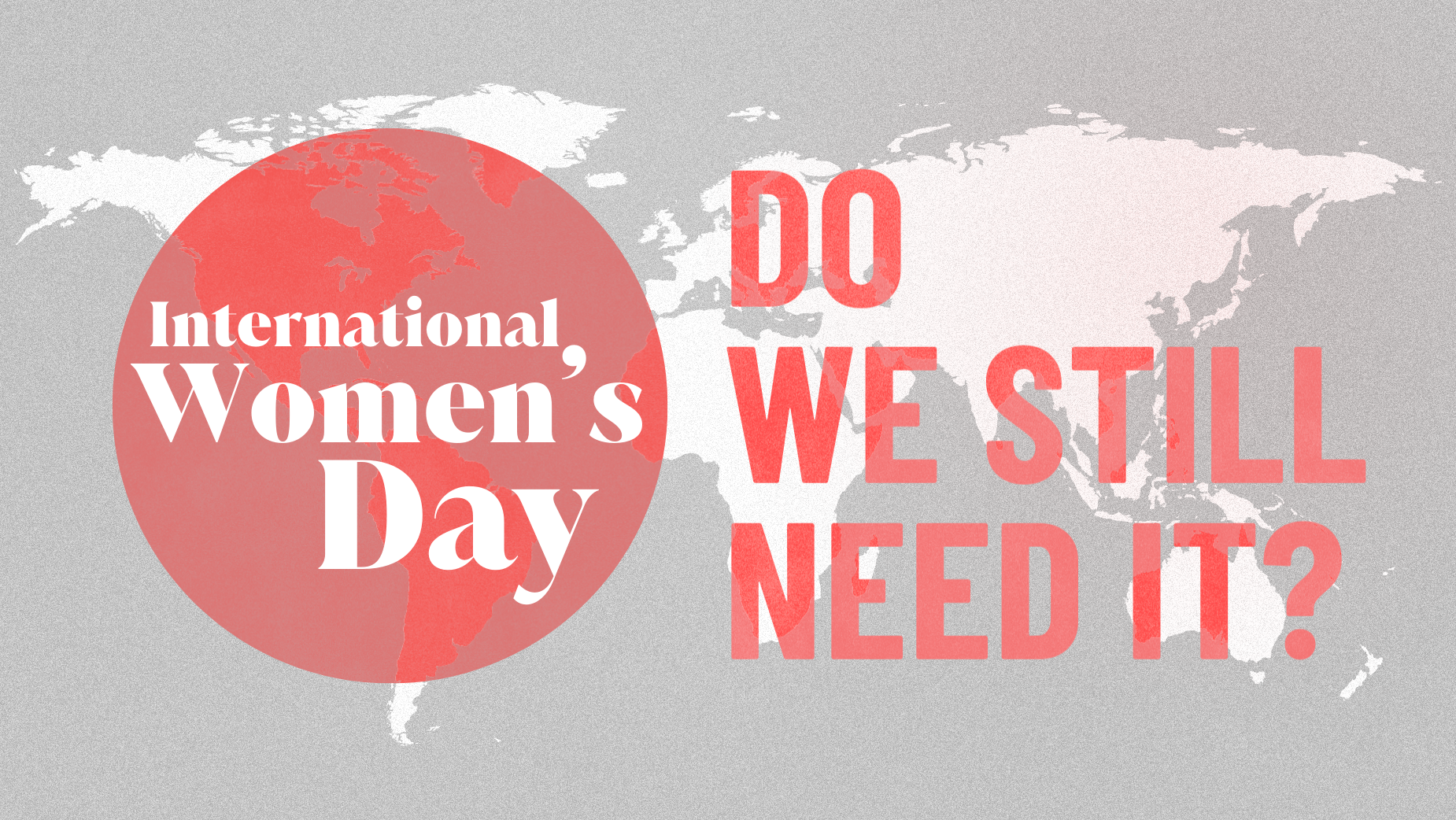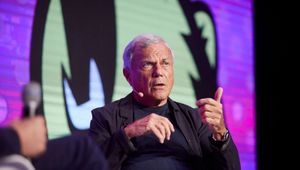
International Women’s Day: Do We Still Need it?

International Women’s Day is finally on our doorstep again, which means it’s time to ‘take stock’ once more. And don’t we just love taking stock!? Perhaps you want to take a look at your board of directors, or your special programmes put in place for women’s talent, or the female directors you took on board this year. Has change finally graced the creative and business worlds, or have the people promising it just been waiting for it to spontaneously happen?
Today has become all about the two-week-long rush at the end of February to prove to the rest of the world that you’ve done your homework, that you’re, at least, in the grey area. Like during Pride Month, brands change their colours and bring out the feminist costume stored somewhere in the Halloween bag. I, for one, feel empowered.
But the intense flurry of activity does beg the question - What about the rest of the year guys? The relevance of IWD is a matter of debate internally and externally, pretty much everywhere. Some believe we’re totally done - brands and C-suites have learned their lesson and now we’re free to vote, so there’s practically nothing left to do. Others are frustrated by the opportunism and the sickly sweet overtone that brands inject into what was once a day for protest. And an entirely third bracket see it as a useful platform to help women who actually don’t get the backing of their agencies any other time of the year.
I spoke to experts from across the industry to find out if this year will be the last for International Women’s Day. Which one are you?
Lucy Hudson
Managing director at McCann Demand, part of McCann Central
International Women's Day remains a key date in the calendar as it draws attention to the achievements and ongoing challenges faced by women around the world. However, at McCann Central our commitment to championing women extends way beyond just one day. Through our Margot Collective, an insight-led female consulting team that harnesses female talent to create effective work that speaks to real women, we aim to represent women to ensure their voices are heard and valued all year round.
Launched last year, this inclusive initiative supports existing clients across the McCann Worldgroup network, drives new business opportunities and provides new insight, research, and provocations to produce more creative and effective work. The result is that female voices are being heard throughout the entire year – not just on International Women’s Day – and provides us with the opportunity to create exciting new and meaningful work for clients that is rooted in DE&I.
Rochelle Palmer
Managing director at Untold Studios
I believe the opportunity to discuss, profile, and celebrate women should always be taken. Not only this, but also, IWD provides a moment to shine a spotlight on the systemic issues that continue to affect women and advocate for meaningful change. Societal shifts happen through a campaign of activity individually and collectively. Just because some brands make us roll our eyes with their tokenism or faux gestures, I don’t think we should turn our back on a platform we can use to discuss the fight for equality. Nor should we allow brands, companies, or indeed ourselves to think it can all be solved by one month of performative allyship.
Sophie Noël
Managing director at heaven
For a very long time, I considered that being a woman was not an issue in my professional life. And yet, I had to struggle against being seen as the ‘wife of’, manage four maternity leaves and had to endure at best sexist remarks and at worst misogynistic ones.
All of this wasn't an issue because I had been conditioned since childhood to believe that it would be my daily life as a woman, that I would have to fight, as if I had internalised that being a woman would come with all of this ‘package’. That I would have to do twice as much, and that's what I did. I have never worked as much as during my maternity leave. It was again the will to say that being a woman would be a non-issue. That only skills should be the focus.
I have now realised, especially thanks to the "Women be board ready" training I did at Essec, that being a woman is definitely something to consider. I just didn't want to admit it.
A lot of things have evolved but we are in a world where it took the Copé-Zimmerman law for boards of directors to open up to women.
We are a quota (and only 40% at that), we are a line in the annual report, parity, whether we like it or not. A report from the World Economic Forum indicates that it will take about 200 more years for real parity in the workplace.
Today, I try to explain all this to my children. The advantage of having four is that hopefully, they will be four to continue to make a difference. Phew, I've worked hard.
Anastasia Brand
Marketing director, EMEA at Tag
Nowadays, we often see backlash in response to celebrations like IWD, with social media encouraging division and binary thinking – with many narratives fueling the untruth that feminism means hating men, and ultimately fostering two opposing sides.
True equality means unity. It's rising up to meet those who have an advantage and being seen as the same. It's not beating them, or being better than them, or oppressing a majority. We are seeing more young men really struggling mentally in a society where they're told they are bad, and because of that, we're seeing certain manipulative opportunists influencing young men to believe women will rise up and take their place. In turn, this makes feminism a threat, not just a matter of equality and respect.
Personally, I believe in showing, not telling. I don't want a company to tell me how great women are, I want to see that their board of directors is diverse, I want to see diversity and inclusivity 365 days a year. I don't want a brand sponsoring a ‘Women in Business’ event, I want to see that they pay their female employees equally. I want a world where female bodies are respected, where our healthcare is prioritised, maternity rights are upheld, and we have freedom to live our lives safely. And I want that for men too. That's equality.
So no, don't give us a day, give us a chance. And celebrate us every time we deserve it alongside any other gender. Women aren't a box to tick, a virtue signalling back pat, we are the same as men. We always have been. Just give us a chance to get on with it, to take up space, and use our voices to make the world a better place.
Lauren Schwartz
EP/owner at kaboom productions
As the person behind a woman-owned company, which has been officially certified as such for about 15 years now, I think about this every day. I think about it intensely when certification time comes around yearly, and I reflect on it when people act performatively in the name of IWD.
Do we still need International Women’s Day? Yes we do. How many female owned and run production companies do you know? Do they make up 50% of all production companies out there? What about female directors? We have a few women directors now and I intend on signing more young talented female directors this year. But how many commercial shoots are actually helmed by women? 50%? Nowhere near.
And agency creatives: The 3% conference started because of the dearth of female creative talent at creative director levels. By last count, I think the creative director number had risen to 13%. Definitely not 50%.
And don’t get me started on the crew and the lack of female representation.
So my point is, until we have parity, until being a woman-owned business or female director, or creative director…or DP, gaffer or production designer is just a regular old thing – we need International Women’s Day.
Yes, it can feel a bit like a greeting card moment. But at least once a year we are reminded that we are not at parity and we need to be. Diverse groups create better work. It’s a proven fact.
We have come a long way. I remember years ago, when I first went through the hassle to become officially certified as woman owned, no one really seemed to care. Icing on the cake, sure. But something a brand sought out? Not really. But now…it is changing. Today, I am invited to pitch on projects because I am a woman-owned business. It gets us in the door to showcase our company and talent when we might not have been able to do so before.
I also applaud Free the Bid (now Free The Work) and all that it has done to amplify female (and other underrepresented) talent. When creatives get to work with diverse talent, they are leveraging voices that can connect to different perspectives. It makes for more compelling work, full stop.
And when we, as a woman-owned businesses, can bring a female directing talent to the mix – well, that is the best outcome you can have. Female director and female run business. Everyone is happy.
But until that scenario is routine we still need International Women’s Day. Until then, I’ll be working towards the moment when it seems unnecessary. And when that happens, it'll be a great moment for our industry and society at large.
Fabienne Queyrane
Global production strategy director at Publicis Production
The straightforward answer is yes – BUT (there’s always a but). While we can all agree that dedicating a day to women's empowerment serves as a reminder of the ongoing need for gender equality, we also need to acknowledge that the buck should not stop there.
International Women’s Day plays a vital role in highlighting gender differences and encourages discussions on female empowerment and equality. While it may not solve all issues, it starts conversations, acting as a launchpad for initiatives across the year, and importantly is a reminder to all that action is required.
It’s a way for individuals and organisations to review their efforts and consider how they can contribute to long-term progress. There should be continued action throughout the year to recognise women and the challenges they face across different markets and industries. This involves addressing issues such as the gender pay gap, childcare and household burdens that impact women's career opportunities.
In our industry specifically, marketing and advertising, IWD has become a platform for self-promotion, with companies and individuals using it to showcase their female talent and commitment to gender equality. While this may serve personal or organisational objectives, it also adds to the broader conversation around women's empowerment. We can also agree that even if these activities don’t directly impact women's careers within agencies, it does contribute towards female awareness and could inspire other women to pursue goals they might have thought were out of reach.
With culture strongly affecting gender equality, there cannot be a one-size-fits-all solution for the challenges women face. What is meaningful in one location, may not be meaningful elsewhere in the world and what needs to be done within one organisation, may not be needed in another.
We need to acknowledge and encourage organisations to sustain efforts beyond IWD, with actions and campaigns that will have the most impact on women where they are. It’s fairly easy to celebrate women in an industry where they are well represented, in others, our priority should be increasing their presence first.
At Publicis, we have a world-wide initiative, VivaWomen!, which supports women with programming centred around three pillars: career progression, work-life balance and influence policy. And specifically in the UK, which is the entity I belong to, a lot is being done to close the gender pay gap as this is a topic that has very much been in the limelight here.
In a nutshell, IWD isn’t enough on its own but without IWD, we would most certainly be far worse off.
Aida Verri
Creative producer at Recipe
Yes, feminism should be addressed on the day to day but, as J. Williams points out, the current model to implement diversity is not fully successful. Women still have to prove themselves repeatedly, adopt masculine behaviour to be seen as competent while being feminised. Those who become mothers have to both prove themselves as involved at work and non negligent of their family. Women feel like they have to compete with people of their own group to keep their place in their company. Simply put, women are walking the workplace tightrope.
To question the need for International Women’s Day demonstrates why we need it - we easily forget the countless women who fought for our place today, it is a celebration of our independence and a platform given unquestionably on one day, when it can be a battle the other 364 days of the year to many. Having a yearly check in keeps the discussion going and pushes the movement ahead; what about paternal leave for all new dads? We can be hopeful that the meaning of the day can evolve but not be forgotten: March 8th, a day to celebrate.
Megan Kelly
Founder and managing partner, Honor Society
Do we still need International Women’s Day? Until we have genuine equality and equity, we still need an International Women’s Day – in fact, let’s make it a month-long celebration! During this annual event, we commemorate our heroes and honour women's gains plus hold our industry accountable for shortfalls in our common goal of equity and equality.
Without International Women’s Day, we are resting on our laurels, patting ourselves on the back saying ‘We’ve come so far! We’ve done it!’.
This is problematic because while we have come so far, we have not crossed the finish line. Stopping once a year to acknowledge women reminds us that we have not yet reached our goals. It forces brands and agencies to review their practices, which can be a catalyst for creating opportunity. Female and non-binary directors are still told too often that they don’t have the experience or the reel to compete for bigger jobs. When brands create work for these directors – and properly fund it – they are giving a director a chance to grow their reel and to make new connections. This annual day is an ideal time to expose brands to new talent. Without a Women’s Day or month, when else would we get to tap the world on the shoulder and remind them we all need to aim higher? What we cannot do is for brands and agencies to tick their “woman” box for the year. International Women’s Day needs to prompt meaningful discussions and accountability and drive change.















